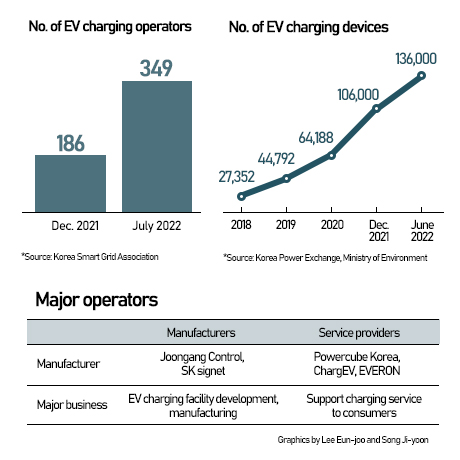EV charging market in Korea burgeoning with big names joining, but lacks regulations
이 글자크기로 변경됩니다.
(예시) 가장 빠른 뉴스가 있고 다양한 정보, 쌍방향 소통이 숨쉬는 다음뉴스를 만나보세요. 다음뉴스는 국내외 주요이슈와 실시간 속보, 문화생활 및 다양한 분야의 뉴스를 입체적으로 전달하고 있습니다.
![[Photo by MK DB]](https://img3.daumcdn.net/thumb/R658x0.q70/?fname=https://t1.daumcdn.net/news/202208/12/mk/20220812100602649jbgh.jpg)
According to Korea Smart Grid Association under Ministry of Trade, Industry and Energy on Thursday, 349 business entities have registered as EV charging service operators as of end of July, up 87.6 percent from the end of December. A majority – 74.2 percent or 259 – of the operators are small- and mid-size enterprises riding on government subsidies.
EV charging market is led by two groups – manufacturers of chargers and operators of micro charging stations. Joongang Control for one produces EV chargers while Powercube Korea and ChargEV run the chargers.
Large companies are also rushing into the burgeoning market.
Global consulting firm Roland Berger projected world’s EV charging market to surge to $325 billion in 2030 from $55 billion in 2023.

LG Electronics in June joined hands with GS Energy and GS Neotek and acquired a full stake in EV charger manufacturer AppleMango. Samsung Fire & Marine Insurance is testing out micro chargers in the southern resort island of Jeju.
Despite the fast corporate move, related safety and maintenance regulations have been laggard.
There are only regulations on standard and 40kW fast charger and no guideline on superfast chargers.
“There is no criteria for superfast charging facilities. Superfast usually refers to a charger of 300kW or faster that can fuel long-range vehicles in minutes,” said an unnamed official from the Ministry of Environment.
Such superfast chargers would be preferred, but they lack Korea Certification Mark that checks on safety.
Mobile chargers, a device that allows drivers to charge vehicles via an electrical outlet with an electronic tag, are available, but also without safety criteria. The chargers have not received government authorization that requires shock and vibration testing.
The government is working on establishing safety-related certification standard.
There is also a need to regulate automakers on accuracy and clarification in marketing on charging time.
Hyundai Motor markets IONIQ 5 Long Range can charge to 80 percent in just 18 minutes with a 350 kW charger. It does not explain how much time it takes using a standard (7~40 kW) or quick charger (over 50 kW).
“A proper standard should be established,” said Lee Hang-koo, a researcher at Korea Automotive Technology Institute. “Consumers should also be offered more diverse charging methods like wireless and battery replacement charging.”
[ⓒ Maeil Business Newspaper & mk.co.kr, All rights reserved]
Copyright © 매일경제 & mk.co.kr. 무단 전재, 재배포 및 AI학습 이용 금지
- SK ready to ship out homegrown Covid jab, SK biopharm loss eases on doubled sales - Pulse by Maeil Business News Korea
- Foreigners turn as net buyers in S. Korean stock market, FX volatility eases - Pulse by Maeil Business News Korea
- EOFLOW to launch insulin patch in Europe next month, shares uplifted - Pulse by Maeil Business News Korea
- The unprecedented rainfall in Korea to land hard on nonlife insurers on soaked cars - Pulse by Maeil Business News Korea
- Coupang achieves positive EBITDA Q2, expects first annual positive EBITDA for 2022 - Pulse by Maeil Business News Korea
- 강경준, 상간남 피소…사랑꾼 이미지 타격 [MK픽] - 스타투데이
- 총선 이후 부동산 정책 변화 짚어보니 [COVER STORY]
- “‘음악’으로 맺어진 ♥”…윤보미·라도, 8년째 열애 ‘인정’(종합)[MK★이슈] - MK스포츠
- 이찬원, 이태원 참사에 "노래 못해요" 했다가 봉변 당했다 - 스타투데이
- 양희은·양희경 자매, 오늘(4일) 모친상 - 스타투데이